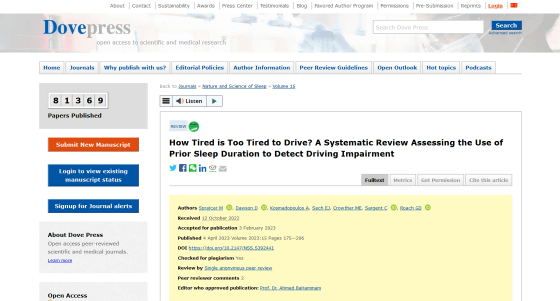Research results that driving a car with less than 5 hours of sleep is as dangerous as drunk driving

Most people should know that drunk driving increases the risk of car accidents, but driving while sleep deprived is also dangerous and can be considered
Assessing prior sleep duration to detect driving impairment | NSS
https://doi.org/10.2147/NSS.S392441

Driving on less than 5 hours of sleep is just as dangerous as drunk-driving, study finds
https://theconversation.com/driving-on-less-than-5-hours-of-sleep-is-just-as-dangerous-as-drunk-driving-study-finds-202514
According to a (PDF file) report released by the Australian Automobile Association in 2021, about 20% of all car accidents are caused by fatigue. Over the past 20 years, the number of accidents caused by drunk driving has decreased significantly , but the number of accidents caused by fatigue has not decreased so much.
Sprajcer et al. cites the following points as to why the number of accidents due to drunk driving is decreasing.
• A significant investment in public education to promote the dangers of drunk driving.
・A line must be clearly set to determine how much alcohol the driver should drink before driving.
• Strong strategies were taken, including campaigns to crack down on drunk driving on the streets.
- Widely publicized court results with severe penalties for drunk driving accidents.
Drivers are also considered drink-driving if they exceed a certain threshold, regardless of how well they actually drive. For example, in Japan, a breath alcohol concentration of 0.15 mg or more is considered drunk driving, while in Australia, a blood alcohol concentration of over 0.05% is considered legally problematic. In addition, the standard of breath alcohol concentration of 0.15 mg or more in Japan is equivalent to about 0.03% when converted to blood alcohol concentration, so Australia seems to be somewhat looser.

Mr. Sprajcer et al. conducted 61 experiments and fieldwork to investigate whether there is a line that can be judged that the driver is unable to drive normally due to fatigue, similar to the blood (breath) alcohol concentration in drunk driving. analyzed the results of the study.
They found that people who slept four to five hours in the last 24 hours were almost twice as likely to have a car accident. This is the same level as the risk of car accidents when the driver's blood alcohol concentration is 0.05%, and it has been shown that lack of sleep increases the risk of accidents comparable to drunk driving.
We also know that the risk of a driver causing a car accident increases as the sleep time decreases. According to the research team, if the sleep time of the previous night was 0 to 4 hours, the risk of causing a car accident increased by up to 15 times.

``Our review suggests that, based on scientific evidence, it may be reasonable to require drivers to get a certain amount of sleep before getting behind the wheel,'' Sprajcer et al. If you're aligned with the risk of being intoxicated, you might consider requiring a minimum of four to five hours of sleep before driving.'
However, while alcohol consumption is largely left to the free choice of individuals, there are cases where sleep time is affected by factors that are difficult to change by individual choice, such as
Sprajcer and others are consulting with various community members and road safety stakeholders to regulate the driving of tired drivers in Australia. Preliminary findings suggest that public education and guidance to avoid driving while fatigued is desirable. Sprajcer et al. ``It may be a while before the law sets out how long to sleep before driving, but I recommend that you keep in mind how many hours you slept in the last 24 hours. If it is less than the hour, you should refrain from driving.'

Related Posts:







